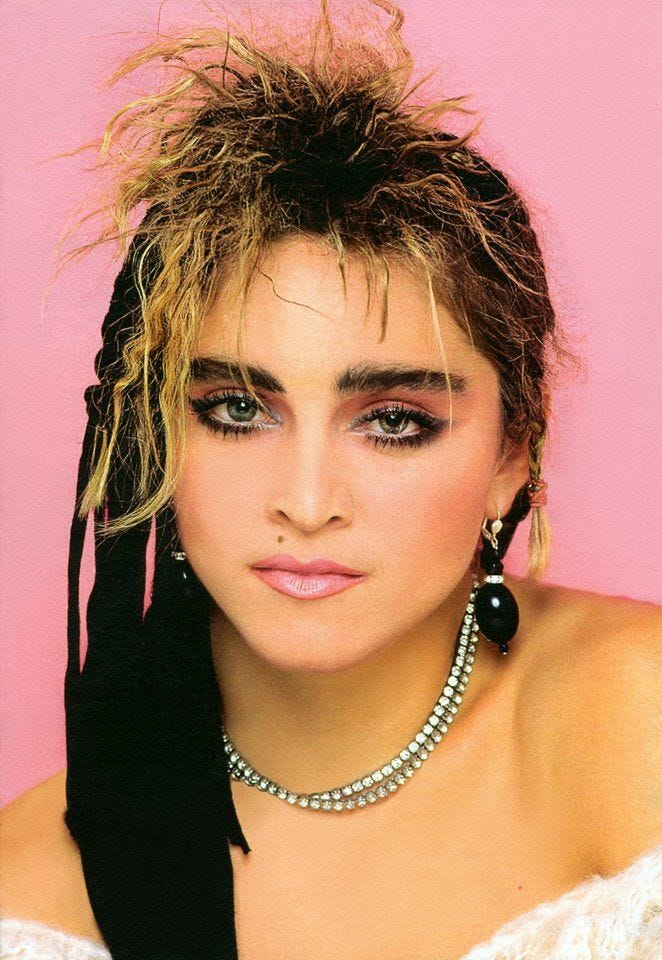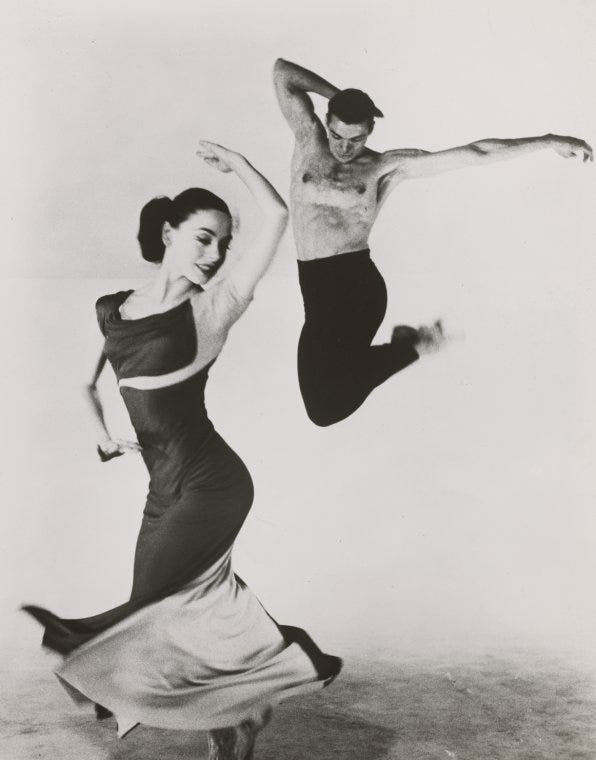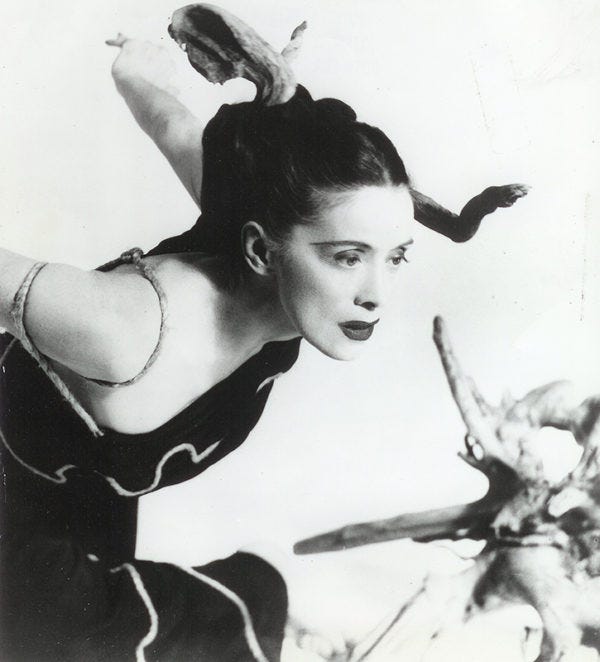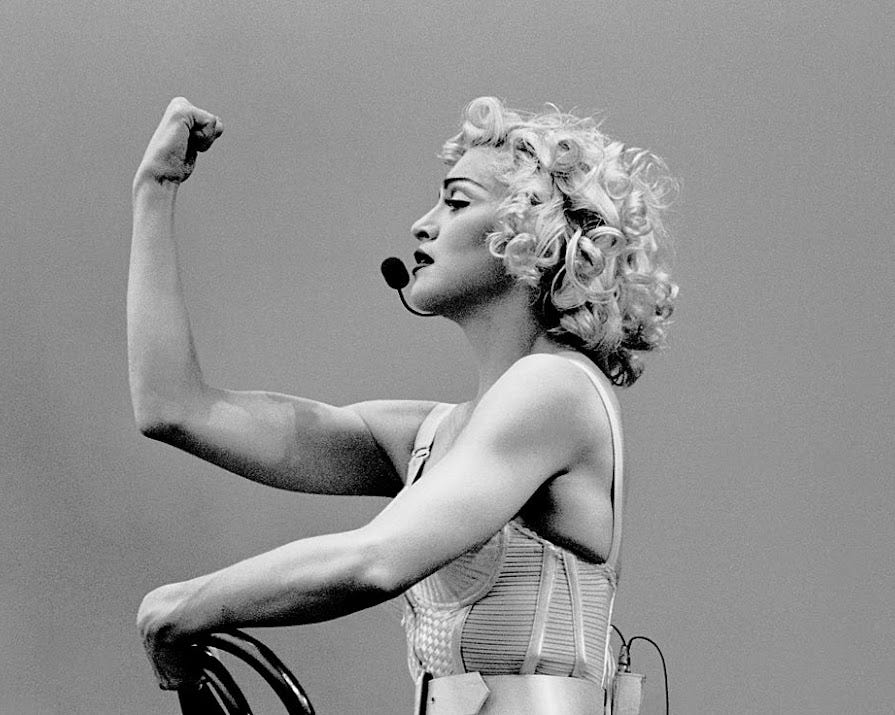77. Madonna - Like A Prayer (Sire, 1989)
I have never read any academic theory about Madonna. One guy reading this just said “Well fuck you then!” and slammed his laptop. To that guy, I am sorry. Here's what I can imagine. Madonna drives academics mad (mad enough to write very long things anyways) because her music is both wildly successful and inherently non-acousmatic. By “non-acousmatic” I basically mean that there is more to the music than the music and with Madonna in particular, never has there been more to music than an artist's music. Let's get into the... “furrow” of it.
In the historical space between disco and rave and, more specifically, between the prominence of drum machines and the prominence of samplers, there existed something called the “megamix”. A megamix is a A DJ tool made of DJ tools, basically a sewing together of B-sides of pop songs, be they the instrumental, extended version, dub version, acapella or percapella versions of the original. Here is an example of a megamix:
What a megamix is intended to do to a dancefloor should be obvious: build energy and give the DJ a pee break. This megamix, predating Madonna's first album, gives a good idea of where the style of her early music sits. Her early records are all rocksteady in tempo, they all count themselves in, they all maintain their mood and tone from start to finish. It is safe for a DJ to introduce them to a mix, and they are therefore more likely to do so. This megamix also helps to explain Madonna's voice. While dance music queens tend to sound like Aretha Franklin or Whitney Houston, or the softer-stated but still soulful “girl next door”, Madonna's voice seems to come from the new romantic and synth pop tradition. Think Spandau Ballet, ABC or the Human League. Those bands are all fronted by men who hit the “women's” register a lot. When Madonna sings like they do she is comfortably lingering in the middle of her range, inflecting her emotion a little, but rarely playing with pitch.
Madonna starts her career as the next big thing in hip hop, but it's kind of a Boyzone situation. Americans, that's when your television debut predates your being able to do your job as an entertainer, leaving you to coast on your charisma. Madonna cannot scratch. She can break, rap and do graffiti, but not to any acceptable standard, and for no more than a few seconds at a time. It's like when a politician shows up to do a working mans job for a photo op. In her first major promo, “Borderline”, Madonna successfully operates a spray can for a few seconds and mills around with a hip-hop crew. In the video for "Everybody", her first single, and the live performance below, she indulges in rap and hip hop dancing at the shallowest level possible, with an audience of ringers, but charms her way through:
Acousmatically there is little to Madonna's first album. Any one of the songs would fit on the soundtrack to Breakin' 2: Electric Boogaloo. The beats are simple, street by way of aerobics (hip hop is in an odd place where drum machines are omnipresent and tempos are at their highest) and most exceed five minutes in length. They do very little with that length, opting to simply be repetitive. They are not cut up or edited in any way but rather asking to be cut up or edited. There's an egolessness to music like this, a spirit of collaboration with the DJs and club-goers. It won't last.
MTV has been going for a couple of years. By setting itself up as a white rockist outlet at a time when all of rock's major personas are drowning in hubris, the station lacks a main character. Madonna rises through their ranks simply by making lots of videos that focus on her face. She appears more professional than the competition thanks to her background in dance, including tutelage with renowned choreographers and future style-inspirations Pearl Lang and Martha Graham.
The promos come thick and fast. They take years to peak in power, owing to low budgets in the early days and an excess of film tie-ins. Until Like A Prayer, it's often pretty hard to figure out whether you are watching a clip of her movie versus a shot made for the video. The promos keep her star rising, but mostly in the world of music, the acting isn't going as well. A notably stinging moment is her Broadway debut Speed-the-Plow. Her musical stardom distracted from the reception of David Mamet's play and a lot of barbs were served at her in the press. Acting behind her, for at least one album cycle, she was free to make Like A Prayer and structure her promos without a need for cinema synergy.
Like A Prayer is some kind of evolution for Madonna. It is similar to the last three full-lengths and relies on some of the same crutches, but there is more colouring-in to the arrangements and more forays into the personal.
It's got a token sugary triplet number (there's one on every album: “I Know It”, “Stay”, “True Blue” and now “Cherish”, a song Madonna would later write off as, shall we say “differently intellectually abled”). The video, a mermaid party on the beach has helped contribute in some small way to the queer fascination with the cryptid. A real interesting thing I took from watching through Madonna's videography is the recurrent theme of acts of kindness to children. There's “Who's That Girl” in which she hallucinates that she's a Ren and Stimpy character in front of a progressive family, “Open Your Heart” in which she casts herself as Liza Minelli and seduces a child in an erotic cinema and now “Cherish”, in which she cuddles a hypothermic mer-boy.
Gone is the reliance on Michael Jackson's Thriller (“Burning Up” and “Material Girl” owe much to “Beat It”, “Holiday” and “Papa Don't Preach” owe much to “Billie Jean”). However, “Express Yourself” is kind of a Kool and the Gang “Celebration” lift. This is what I mean about there being more to Madonna's music than her music. David Fincher heard “Express Yourself”, read between some lines and went: “Give me five million dollars and get Madonna and Jean Paul Gaultier on the horn. We're remaking Metropolis!”
(“Express Yourself”. The birth of “Born This Way”)
The middle of the record houses a conceptual suite in which Madonna visits her attention on different family members: “Till Death Do Us Part” on former husband Sean, “Promise to Try” on her late mother, “Oh Father” on her father, “Keep It Together” on the siblings. The most musically interesting of these is “Dear Jessie” with its bits of Kate Bush's “Cloudbusting” and Sgt. Pepper-era Beatles. It comes from Madonna having a maternal moment with her co-producer's daughter, but the psychedelia of the lyrics (pink elephants, roses raining, “the love parade”) invites various readings depending on who she is considered mother to in the moment. It could be the darkest song on the album, or the lightest. The video is a bit shoddy. I wish it was her taking another wide-eyed child actor to Berlin's Love Parade.
“Spanish Eyes” is the slow power ballad. Madonna doesn't have the chops for this song; its perpetually descending chorus would be better belted out by the likes of Duran Duran, masters of the perpetually descending chorus. That said, the reaching and the not getting there fit the song's theme of the elusive exotic, making it kind of a favourite for me.
“Love Song” is a Prince-penned duet. I think Prince likes Madonna records better when a DJ is chopping them up, cause this song flows like a performance of a remix. There are lots of effects, SFX, rhythmic subversions. It's a bit of an upstaging, being extremely technical compared to the rest of the songs (also, Prince is the first and last musician you hear on this Madonna album), but it did give her the lyric “Time goes by / so slowly” which would prove useful in sixteen years time.
The main event is eucharistic, euphemistic singalong banger “Like A Prayer”. Its directness kind of pisses on “Love Song”, along with its fusion of Bangles and Bad-era Jacko. The video is fantastically tasteless and gives us perhaps the comic apex of her videography, the moment where Madonna accidentally gives herself stigmata, then looks to the camera in an “Oops. My bad?” moment before sending the camera to the previously unseen choir, with a flick of her face. It's good stuff. My only criticism is that the line “it's like a dream, no end and no beginning” is not followed through on as the like-a-dream plot climaxes in bows, a falling curtain and a “The End”. The album however follows through by making the end, “Act of Contrition”, the beginning in reverse with backwards masking and a sarcastic rosary on top.
Did It Make Much Of A Splash?
Along with David Bowie and Taylor Swift, Madonna is perhaps the most responsible for the notion of an “era”, an album supported by a facet of its artist, blown up to whimsical proportions. Eras transcend the boundaries of reality and creation, in that they exist in the art, the artist, the persona, performance and press. At the level operated on by these stars, we are all subjects to their mythmaking. A minor example of this is that the supporting tour for Like A Prayer, The Blonde Ambition Tour, was denounced by Pope John Paul II as being “one of the most satanic shows in the history of humanity”. Say what you will about Madonna, but she made Il Papa her fucking press officer.
Another significant thing is that Madonna was in this period able to put a choke hold on the music press, rattling them with legal demands, threatening to withhold review copies, forcing them to have pre-approved interview questions and paving the way for future stars to sidestep the music press altogether. This means that not just anyone can ask a star a question anymore, potentially good in theory, even useful sometimes, until you deal with the fact that journalists are having to take care not to offend on pain of not just their own career, but the continued existence of their publication. Kinda fucked.
A more responsible wielding of such massive power is the fact that Like A Prayer came packaged with some rudimentary AIDS fact sheets. In its time this wasn’t just queer-positive, it was an effective targeted attack on queer death and bereavement itself. No wonder the clergy were up in arms.
Where To Go From Here?
I have listened to all the Madonna albums for some reason and the “pick” is Like A Prayer.
There is minor controversy in my immediate euro-centric sphere about whether Ray of Light should have been the pick. To those people, I ask: have you listened to that album start to finish? Yes it is interesting, because she has had singing lessons, courtesy of Andrew Lloyd Webber, she has become a mother for the first time, she has discovered new age spirituality, she is working with a producer who vibes well with her, Princess Diana has died, but have you listened to it lately? Stick on “Shanti Ashtangi” and we'll reconvene in five. Yeah, you didn't like that, did you? William Orbit is kind of an anomaly, an electronic musician operating in the tradition of Mike Oldfield or Jean-Michel Jarre. His solo music blows, absolutely stinks, but he had an interesting phase around this time of making these goofy epic remixes for rock bands like Blur and 18 Wheeler. The title track and “Beautiful Stranger” are top-tier, but wait a tick: “Beautiful Stranger” isn't on the album, it's property of Austin Powers.
I wish that Erotica was the pick. It had a very talented line-up behind it and the conceptual approach to sampling is intriguing in principle, but it's very light on content. I just don't think that Madonna was there or all-there for some of it. Given that Like A Prayer was released between two soundtracks, and that the promotion of Erotica coincided with the promotion of coffee table controversy Sex, Madonna was spreading herself thin at this time. One of these soundtracks I'm Breathless (Music From And Inspired By The Film Dick Tracy) is a conceptual nightmare of the sort that only Mark Hamill or Jenna from 30 Rock could get mixed up in. I kind of love it for that. Inexplicably, this is the Madonna album which houses her most significant single, “Vogue”. Similarly stranded is “Justify My Love”, appearing only on greatest hits album The Immaculate Collection. Erotica has nothing so arresting on board, besides the video for “Rain”.
Madonna basically devoured electroclash as it sprang up, being by far its most successful exponent, just as the budget fell out of music promotion, leaving Fischerspooner as one-hit wonders and DJ Hell and Miss Kitten as clubland concerns. Madonna did some interesting work in that micro-age with producer Mirwais, best of all “Don't Tell Me”. It's interesting how crazy his production would get, pushing singles like “American Life” and “Die Another Day” (the only Bond theme ever written about Madonna) into IDM levels of fiddliness. They still collaborate, so he must work fast.








